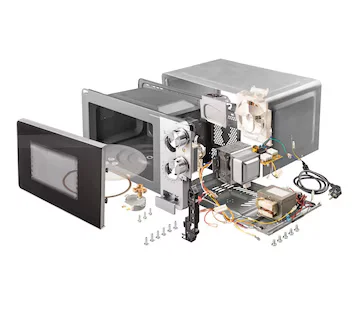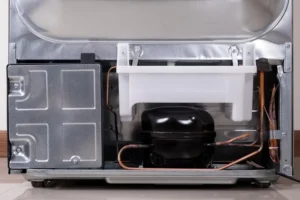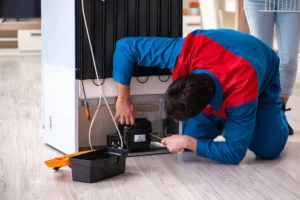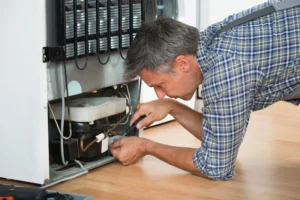
By Admin
Learn how to identify a faulty refrigerator compressor with expert insights. Know the key signs, causes, and when to seek professional help from one of the best refrigerator repair services. Get practical tips for diagnosis and repair.

Refrigerators are essential household appliances that keep food fresh and beverages chilled. However, like any other machine, they can face technical issues over time, and one of the most common problems lies with the Compressor Unit. The compressor is the heart of a refrigerator, responsible for maintaining proper cooling. When it malfunctions, it can lead to spoiled food, rising energy bills, and frustration.
In this guide, we’ll explore how to identify a faulty Compressor Unit, the common signs, testing methods, and when to seek help from professionals offering the best refrigerator repair services in Kolkata.
Before identifying a fault, it’s essential to understand the role of a refrigerator compressor. A compressor functions as the core of the refrigeration system, circulating the refrigerant gas through the coils. This helps in:
When the Fridge Compressor develops an issue, it disrupts the entire cooling cycle, and identifying it early can save time, money, and food wastage.
Identifying a faulty Fridge Compressor can be tricky, especially if you’re unfamiliar with refrigerator mechanics. Below are some common signs that your compressor might need repair or replacement:
The most obvious sign of a compressor problem is improper cooling. If you notice that:
This indicates that the refrigerator compressor might not be functioning effectively. The compressor is responsible for circulating refrigerant, so any issue can severely impact cooling.
Refrigerators typically emit a low humming sound, which is normal. However, if the sound becomes unusually loud, clicking, or buzzing, it’s a red flag.
Unusual noises shouldn’t be ignored as they often precede complete compressor failure.
Touch the back of your refrigerator where the compressor is located. While it’s normal for compressors to be warm, excessive heat can signal trouble. Overheating is often caused by:
If you notice the compressor is too hot to touch, it’s time to call the best refrigerator repair services in Kolkata for an inspection.
A faulty compressor may cause your refrigerator to cycle on and off frequently. This irregular cycling happens because the compressor struggles to maintain the set temperature.
Common reasons include:
Frequent cycling not only affects performance but also increases electricity consumption.
If your electricity bills have unexpectedly risen, a malfunctioning refrigerator compressor might be to blame. When a compressor struggles, it consumes more power to maintain the refrigerator’s cooling, leading to higher energy usage.
Check for any of the following:
These issues combined with rising energy costs are a clear indication that the compressor needs attention.

If you suspect a faulty Refrigerator Pump, here are simple steps to test it:
If the compressor clicks on and off repeatedly, it could indicate internal failure or overheating. Clicking sounds often signify that the compressor motor is unable to start properly.
Place a thermometer inside the refrigerator and freezer compartments. If temperatures are rising despite the compressor running, there’s likely an issue with its performance.
Understanding the causes of compressor failure can help prevent issues in the future. Here are the most common reasons:
If you notice any of the signs mentioned above, it’s time to call for professional help. Compressor issues can worsen quickly, leading to a complete refrigerator breakdown.

On average, a Fridge Compressor lasts about 10-15 years. Regular maintenance can extend its lifespan.
No, the compressor is essential for circulating refrigerant and maintaining cooling.
Common causes include overheating, refrigerant leaks, dirty coils, or electrical failures.
If the refrigerator is relatively new, replacing the compressor is worth it. However, for older models, replacement might be a better option.
The Refrigerator Pump plays a crucial role in maintaining your appliance’s performance. Identifying issues early can save you from costly repairs and potential food spoilage. Look out for signs like improper cooling, unusual noises, overheating, or high energy bills to determine if your compressor is faulty.
For professional diagnosis and repair, consider trusted experts offering the best refrigerator repair services in Kolkata. With timely intervention, you can restore your refrigerator’s efficiency and extend its lifespan. Don’t wait until the problem worsens—addressing compressor issues early is the key to smooth, hassle-free performance.